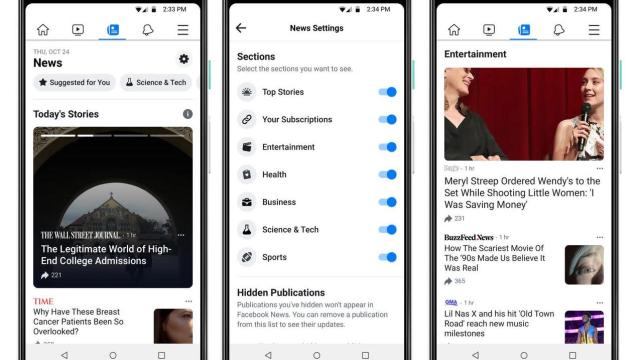On Friday, Facebook started tests of what seems like its umpteenth attempt at handling journalism on the platform—a dedicated Facebook News section for users that lives separately from the standard News Feed on its mobile app and licenses content from the outlets writing it.
This is far from Facebook’s first foray into the news business. In fact, the company has a long history of fucking this up big time. Facebook helped fuel news outlets’ utterly disastrous pivots to video with BS data before yanking funding and leaving them in the lurch. It also ditched reader apps, launched the largely abandoned Instant Articles platform, and has continually screwed with the News Feed to the detriment of publishers which use it as a distribution platform. (In one particularly nasty case, Facebook “tested” removing journalism from news feeds in six countries without warning or prior input.)
Facebook’s much-vaunted Watch tab, which it similarly pitched as a vehicle for journalism, also seems to be tanking despite significant efforts to juice engagement. So there is every reason to be wary that Facebook is gonna faceplant again, doing collateral damage in the process. As TechCrunch argued, everything Facebook offers is conditional and it sucks most of the value of content into itself, so perhaps publishers would be better off trying to lure readers and revenue to their own sites and properties rather than throwing themselves wholesale into Facebook’s journalism mosh pit.
Anyhow, here’s how it works.
According to Facebook’s announcement, the Facebook News product will have a curated Today’s Stories section managed by Facebook staff; personalisation features “based on the news you read, share and follow” to keep the section “fresh and interesting”; topic sections; the ability to link news subscriptions; and controls to hide specific articles, topics, and publishers that a given user doesn’t like. Clicking a link in the app will send the user to the publisher’s website rather than attempting to keep them in Facebook’s walled garden, according to the Wall Street Journal, which also noted this is the first major commitment by the social network to pay major licensing fees to journalists.
Facebook said that it decided on a curated model after hearing concerns from media that “machine learning has limits” and an automated system wouldn’t reward in-depth reporting. It previously had a trending news section moderated by humans, but it was cut following an extremely controversial Gizmodo article in 2016 in which Facebook workers claimed the social network suppressed the spread of articles from conservative sites, prompting a backlash from right-wingers. So that’s back. The company also insists that the editors running the curated section will have full editorial independence and are cleared to run content that reflects poorly on Facebook itself, but it remains to be seen whether the hand that feeds will restrain itself from intervention.
Additionally, Facebook outlined requirements for publishers that want to participate in the program. That includes registering their account as a news page and abiding by Publisher Guidelines. Those guidelines subject publishers to third-party fact-checkers; some involved in those efforts have characterised them as ineffectual and of questionable usefulness, while its choices of fact-checkers (such as a subsidiary of the alt-right website the Daily Caller) and their impartiality have also been questioned. But it’s something. Other guidelines are run of the mill, including bans on hate speech, clickbait, and efforts to game engagement on the system.
Facebook is also shelling out what counts as big money in journalism, with the New York Times reporting that it’s struck “some deals well into the millions of dollars” with some outlets. (The inclusion of far-right site Breitbart, a disinformation hub with a very long history of sympathizing with white “nationalists”, as a Facebook News partner has rankled many. But the Times reported that Facebook is not paying them to participate.) Facebook says it is also going to attempt to boost local journalism by partnering with news publishers in places like Dallas Fort-Worth, Miami, and Atlanta.
Facebook has a lot of competition to fend off. Apple has also launched its own platform, Apple News Plus, which Nieman Lab has described as a disappointment for publishers. There’s also Amazon Kindle Magazines, which is arguably targeting a different part of the news market. Finally, it remains to be seen whether mobile users have any appetite for a dedicated news section. Time will tell if this somehow works out to everyone’s benefit or becomes another ruin in Facebook’s wake.
“The Facebook news tab is a shiny new object to distract from the damage Zuckerberg has done to journalism, and a ploy to steal journalists’ content without compensating us,” Save Journalism Project co-founder Laura Bassett told Ad Age in a statement. “This initiative will only further his agenda to derail the journalism industry so that Facebook can be the bearer of all the news.”
